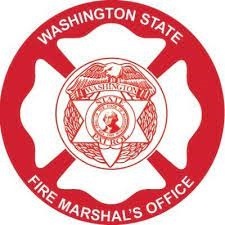
1.25.24 – Washington State Fire Marshal’s Office – Olympia
In 2022, the State Fire Marshal’s Office (SFMO) reported that approximately 89 percent of reported fire fatalities occurred in locations where smoke alarms should have been installed. Working smoke alarms save lives, and smoke alarms should be installed and maintained in every home.
In a National Fire Protection Association (NFPA) report on home smoke alarms, the risk of dying in home structure fires with working smoke alarms is reduced by 55 percent.
In 2022, the State Fire Marshal’s Office (SFMO) reported that approximately 89 percent of reported fire fatalities occurred in locations where smoke alarms should have been installed. Working smoke alarms save lives, and smoke alarms should be installed and maintained in every home.
The SFMO wants to remind everyone to:
- Install smoke alarms in every sleeping room, and on every level of your home.
- Ensure your smoke alarms have functional interconnectivity for the best protection.
- Ionization alarms are more responsive to flaming fires and a photoelectric smoke alarm is more
responsive to smoldering fires. Photoelectric alarms are the best type installed near the kitchen and
bathrooms. - Test smoke alarms at least once a month, and if battery operated, change the batteries upon changing
your clocks during daylight-saving’s time. - Smoke alarms are designed to remain effective for up to 10 years and should be replaced per
manufacturer’s instructions. - For rental housing, contact your landlord or property manager for help, as all rental housing must have
working smoke alarms upon taking possession of the housing in accordance with RCW 43.44.110.
For more information contact the State Fire Marshal’s Office at (360) 596-3929
The State Fire Marshal’s Office is a Bureau of the Washington State Patrol, providing fire and life safety services to the
citizens of Washington State including inspections of state licensed facilities, plan review of school construction projects,
licensing of fire sprinkler contractors and pyrotechnic operators, training Washington States firefighters, and collecting
emergency response data.
